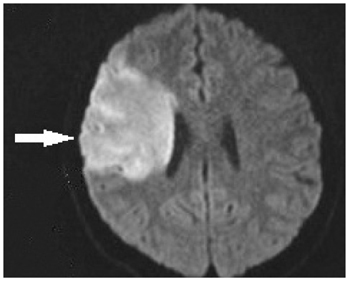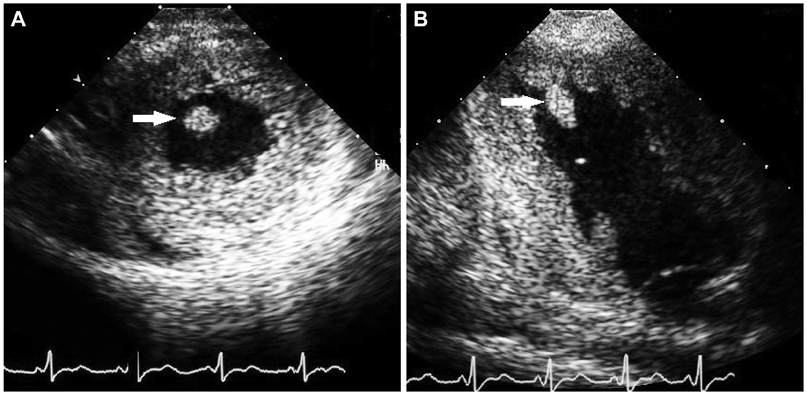Korean Circ J.
2013 Mar;43(3):204-206. 10.4070/kcj.2013.43.3.204.
A Case of Myopathy, Encephalopathy, Lactic Acidosis and Stroke-Like Episodes (MEALS) Syndrome with Intracardiac Thrombus
- Affiliations
-
- 1Sahmyook Medical Center Seoul Hospital, Seoul, Korea. mulgang@gmail.com
- KMID: 2224968
- DOI: http://doi.org/10.4070/kcj.2013.43.3.204
Abstract
- Myopathy, encephalopathy, lactic acidosis and stroke-like episodes (MELAS) is a multisystem clinical syndrome manifested by mitochondrial myopathy, encephalopathy, lactic acidosis and recurrent stroke-like episodes. A 27-year-old female with MELAS syndrome presented with cerebral infarction. Echocardiography revealed a thrombus attached to the apex of the hypertrophied left ventricle, with decreased systolic function. The embolism of the intracardiac thrombus might have been the cause of stroke. There should be more consideration given to the increased possibility of intracardiac thrombus formation when a MELAS patient with cardiac involvement is encountered.
Keyword
MeSH Terms
Figure
Reference
-
1. Lam CW, Lau CH, Williams JC, Chan YW, Wong LJ. Mitochondrial myopathy, encephalopathy, lactic acidosis and stroke-like episodes (MELAS) triggered by valproate therapy. Eur J Pediatr. 1997. 156:562–564.2. Goto Y, Nonaka I, Horai S. A mutation in the tRNA(Leu)(UUR) gene associated with the MELAS subgroup of mitochondrial encephalomyopathies. Nature. 1990. 348:651–653.3. Chae JH, Hwang H, Lim BC, Cheong HI, Hwang YS, Kim KJ. Clinical features of A3243G mitochondrial tRNA mutation. Brain Dev. 2004. 26:459–462.4. Börner GV, Zeviani M, Tiranti V, et al. Decreased aminoacylation of mutant tRNAs in MELAS but not in MERRF patients. Hum Mol Genet. 2000. 9:467–475.5. Oguro H, Iijima K, Takahashi K, et al. Successful treatment with succinate in a patient with MELAS. Intern Med. 2004. 43:427–431.6. Kim HS, Kim DI, Lee BI, et al. Diffusion-weighted image and MR spectroscopic analysis of a case of MELAS with repeated attacks. Yonsei Med J. 2001. 42:128–133.7. Hirano M, Pavlakis SG. Mitochondrial myopathy, encephalopathy, lactic acidosis, and strokelike episodes (MELAS): current concepts. J Child Neurol. 1994. 9:4–13.8. Vydt TC, de Coo RF, Soliman OI, et al. Cardiac involvement in adults with m.3243A>G MELAS gene mutation. Am J Cardiol. 2007. 99:264–269.9. Okajima Y, Tanabe Y, Takayanagi M, Aotsuka H. A follow up study of myocardial involvement in patients with mitochondrial encephalomyopathy, lactic acidosis, and stroke-like episodes (MELAS). Heart. 1998. 80:292–295.10. Sproule DM, Kaufmann P, Engelstad K, Starc TJ, Hordof AJ, De Vivo DC. Wolff-Parkinson-White syndrome in Patients With MELAS. Arch Neurol. 2007. 64:1625–1627.
- Full Text Links
- Actions
-
Cited
- CITED
-
- Close
- Share
- Similar articles
-
- Erratum: A Case of Myopathy, Encephalopathy, Lactic Acidosis and Stroke-Like Episodes (MELAS) Syndrome with Intracardiac Thrombus
- General Anesthesia with Sevoflurane for a Patient with MELAS (Mitochondrial Myopathy, Encephalopathy, Lactic Acidosis, Stroke-like Episodes) Syndrome: A case report
- Status Epilepticus as the Initial Manifestation of Mitochondrial Myopathy, Encephalopathy, Lactic Acidosis, and Stroke-Like Episodes Syndrome
- Wolff-Parkinson-White Syndrome in a Patient With Mitochondrial Encephalopathy, Lactic Acidosis and Stroke-Like Episodes Syndrome
- A Case of MELAS Syndrome Diagnosed in a Woman in Her 50s




